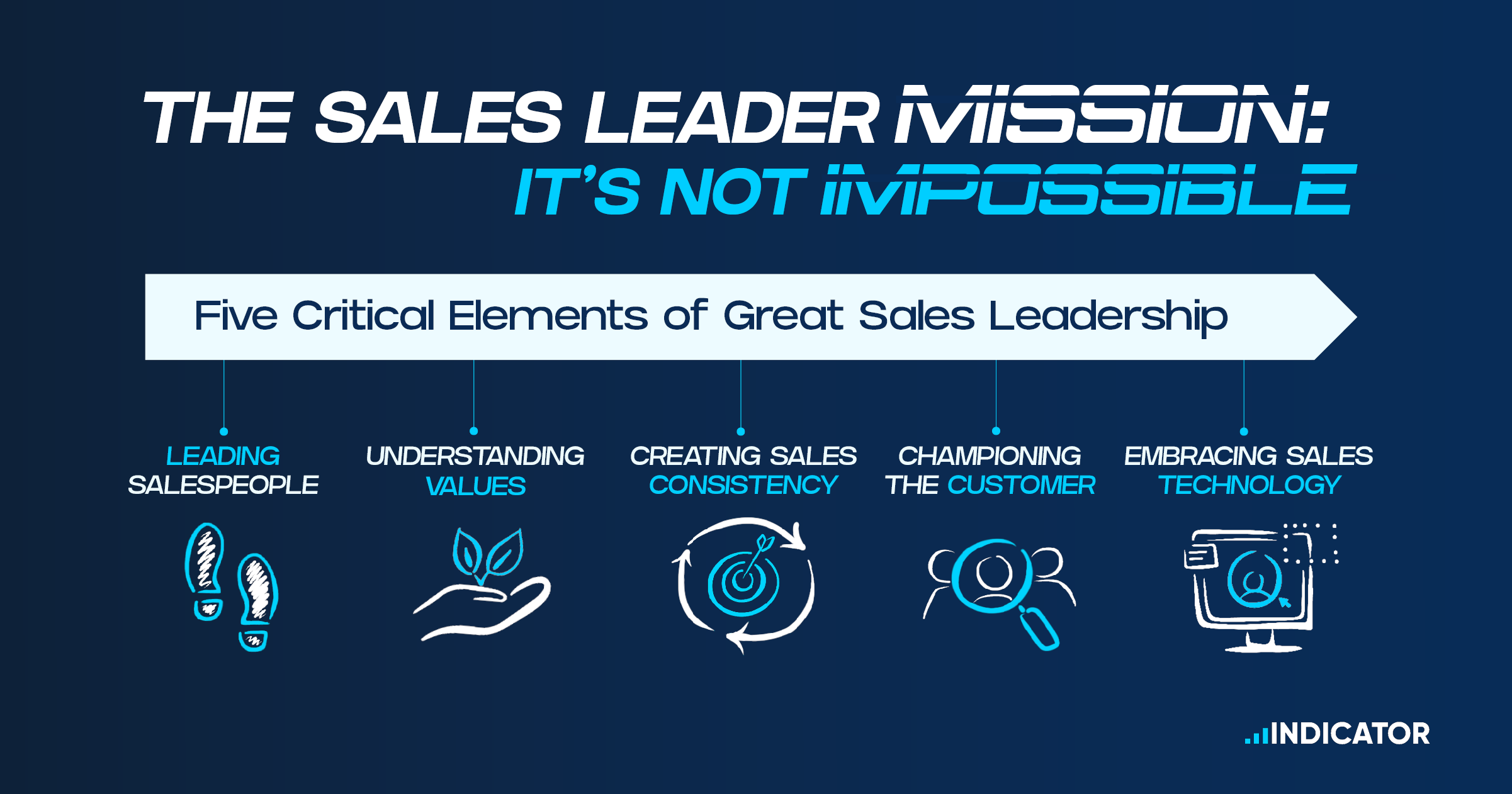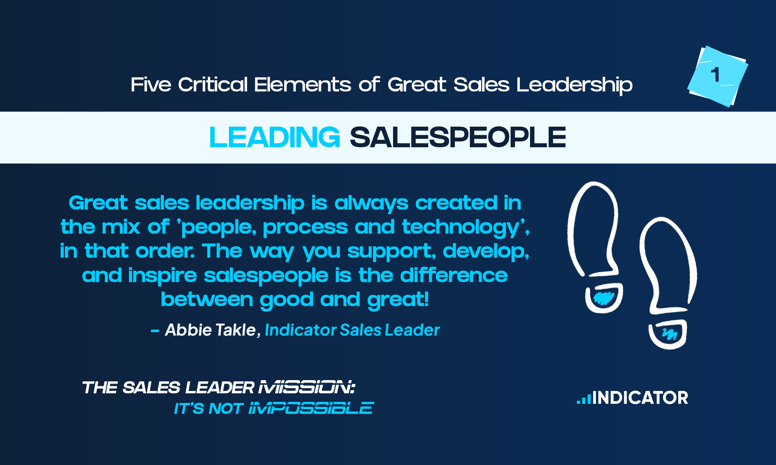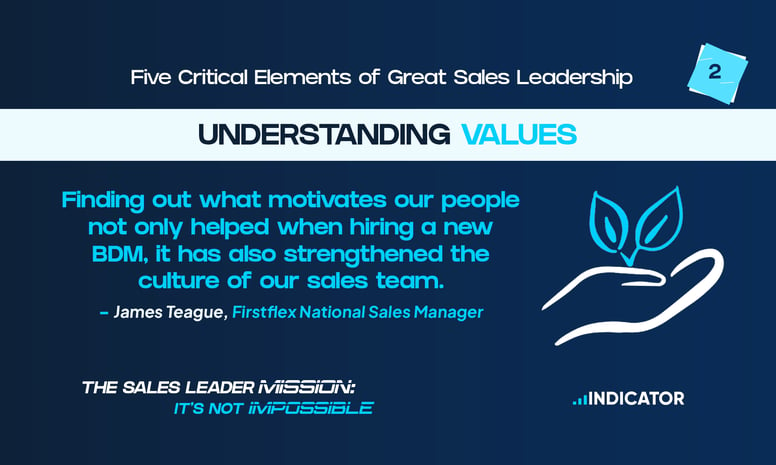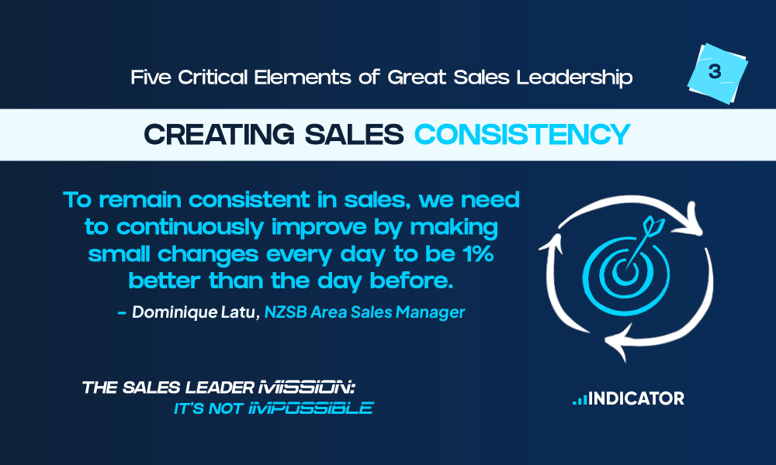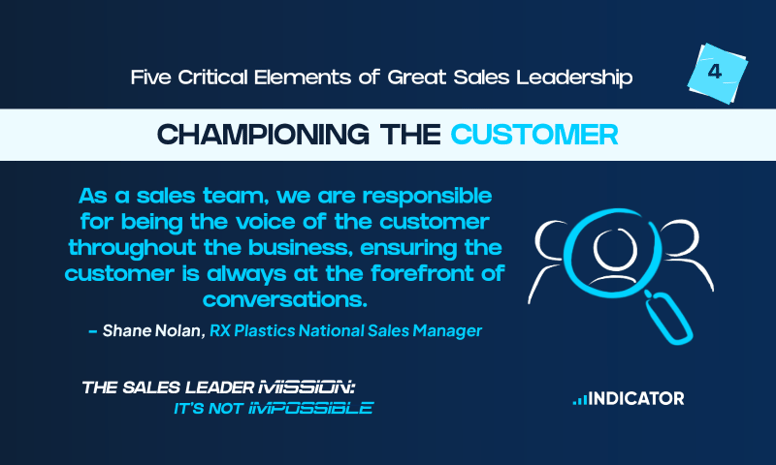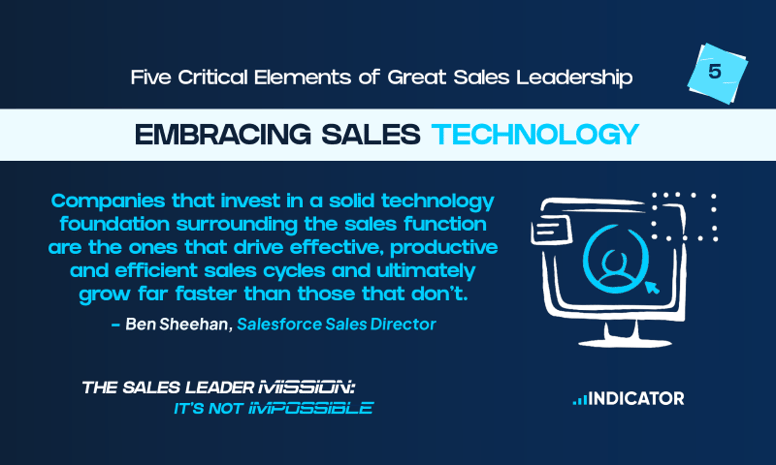At Indicator we believe that the role of the Sales Leader is one of the most challenging yet critical in every business. There are so many different facets to the role and one of the greatest challenges in most companies, is that Sales Leadership is still misunderstood. None of us went to university to learn Sales Leadership. If we are lucky, we might have had a good sales leader we reported into, or we may have worked for a multi-national which had some good structure in Sales Leadership.
For this reason, in 2015 Indicator started a programme called Sales Syndicate. Sales Syndicate sought to remove some of the mystique of sales and enable Sales Leaders to learn not only from experts but from their peers. 7 Years later, this programme is still going strong, yet not surprisingly the same issues still arise across businesses today.
Through the Sales Syndicate programme and having worked with hundreds of businesses across New Zealand and Australia, we are in a unique position to see what works and what doesn’t. We follow international trends and insights but most of our learnings come from our clients. We have been extremely lucky to also be able to learn and share insights from the incredible information shared with us for the Indicator Mood of the Sales Leader Survey each year.
In essence, great sales leadership has a focus on People, Process and Technology. Over the coming weeks we are going to share critical insights into what we believe is vital for all sales leaders. We are calling this “The Sales Leader Mission - It's Not Impossible” in reference to the journey we all need to be on to improving our knowledge, and our execution in these five critical areas.
5 Critical Elements of Great Sales Leadership: One
1. Leading Salespeople
Sales Leadership is an extremely challenging role and not for the faint hearted. Salespeople can be challenging to manage; sales managers can often report into individuals that may not necessarily understand what good sales leadership is and looming over our heads is this thing called ‘targets”. It’s tough constantly being measured on the success of your last quarter, but it can also be an extremely rewarding and exciting opportunity to have a significant impact on your company.
In the past 12 months, we have had the pleasure of hearing from Gilbert Enoka and Kate Milburn who presented at Sales Syndicate workshops. One comment from Gilbert which stood out from his session, was that as a leader you need to be “tirelessly tweaking”. Kate shared that trust as a leader is built through consistency in how you react and respond and it is often the small things and actions towards others that matter the most.
Here is our simple check list for Sales Leaders:
- Build your team – be the best recruiter by enticing the best to work for you, make your role exciting and be aware that the best people are likely to have options.
- Support your team – your number one goal is to make your team better, provide extreme clarity on what is expected of them and what they need to be successful. Your sales team need to know that the leader has their back and will do everything they can to help them succeed.
- Remuneration – is the way we link our worth with others. It is important, but make sure it is not the only reason why salespeople want to work with you.
- Don’t tolerate bad performance – by tolerating bad performance you are doing a disservice to that person and the wider team.
- Development – just like a coach does for a sporting team your goal is to continue to develop your team to make them better and build a better future for them.
- Culture – ABC no longer means ‘Always be closing’, more importantly “Always be culturing”. Be deliberate in your approach to culture and continue to monitor and improve.
- Provide Feedback – Salespeople need plenty of praise to embed great behaviours, don’t wait for the big stuff, also praise the small stuff and think of 5:1 ratio of positive to corrective.
- Process, Process, Process – Document, train and iterate your sales process and never view it as complete. Provide a clear guideline on how a sales methodology can support your sales process.
- Technology – It is important, don’t hide from it. Technology has never moved so quickly, and we will never move so slowly again. Don’t get left behind. The best salespeople want to work for the best companies that have the best tools and the best technology that make salespeople superhuman. Two
2. Understanding Values (motivators)
Typical areas that salespeople value:
- Excellence – to be the best at what they do
- Remuneration – to be financially rewarded
- Flexibility – to have flexibility in where and how they work
- Purpose – to be involved in something that has a higher value
- Opportunity – to see a pathway to a better future
- Recognition – to be recognised for their successes
- Culture – to have a love of the organisation and the people they work with
The reason why this is top of mind for many leaders right now is that the recruitment market is extremely tight and according to the Mood of the Sales Leader 81% of salespeople were approached about a new role in 2021. We expect to see similar numbers in 2022. Understanding the values of your team enables you to work well with them, but it also provides insight on how best to retain them.
We often ask our team what motivates them, but we typically never get the real answer in the first response. You need to keep probing and drilling deeper to truly understand what drives someone. If we know what really floats their boat, then we can put strategies in place to keep them happy and motivated. In the current environment, with salary wars going on, running a process like this can also help crystalise the views of the team member who will then think twice about jumping at a big money offer if their current role is meeting their needs.
Here is a simple process you can run with your team.
- Elicit Values
- What’s most important to you?
- If you had all these what would cause you to leave?
- Order the values
- Is ‘x’ more important than ‘y’ or is ‘y’ more important than ‘x’?
- Is ‘x’ more important than ‘y’ or is ‘y’ more important than ‘x’?
- Drill down into the values
- What does this value mean for you?
- How do you know when you have it?
- Why is that important? Three
3. Creating Sales Consistency
Consistency is the holy grail of a successful sales team. When we say consistency, we mean consistency of successful inputs to reach consistency of successful outputs. It is an area which most companies struggle with in sales, but without it, we are relying on individuals to perform in their own way, and we have no way of controlling customer experience or success. If we can achieve consistency, then we can constantly monitor and improve, which can be a complete game changer
for an organisation. Ultimately, we are looking to enable all our team to be successful, and to be successful month in and month out.
A successful sales leader will create a clear vision of how their team and their business sells, and then they will continue to monitor, manage, and iterate how their team performs. US sales legend Mike Weinberg joined us on the expert series near the end of 2021 and highlighted that our first role as a Sales Leader is to make it clear “how we sell” at our business, and then our second is to hold the team accountable to the process and our expectations.
To provide consistency in sales there are some key areas to focus on, which we will call the Sales
Leader checklist:
- A sales process is the foundation of how we sell at our business
- A sales methodology to highlight how we approach each part of the sales process
- Be clear on the problems you solve and what is our Unique Selling proposition
- Know our Ideal Customer profile and our Non-Ideal customer profile
- Sales meetings solely based on improving the team capability and performance
- Share and monitor your expectations of cadence and habits
- A CRM to support the sales process and the salesperson
- An induction process that is focused on how we sell
- Ride Alongs to observe and coach the salesperson in action
- One on ones providing expert view on the individual and how they can improve
- Do not be scared about keeping your team accountable
- Celebrate successes
Wrap this up in a playbook and you are half-way there to being a successful sales leader. Four
4. Championing the Customer
“Customer is King” is an age-old mantra which reflects the importance of customers in every business. Regardless of the industry or business you are in, your customers and prospects will always be your most valuable stakeholders. By challenging your sales team to look to add value at every stage of customer engagement, you will deliver better results for them.
As a sales leader your role should be to ensure your salespeople and the wider business have clarity on purpose when interacting with prospects and customers. What exactly are they there to do. Sales and targets are important, but great sales leaders build a sales culture based on successful outcomes for their clients as well as their company. By driving your team to be customer focussed, where salespeople provide real solutions and meet customer expectations you will build engaged, loyal customers who become advocates for you.
Jeff Bezos (Amazon) initiated the idea of an empty seat at each meeting leaving this for the customer which is a strategy that has worked well for them. You may not need to implement this strategy when focusing on customer centricity, but a simple change of mindset will be a good start. Make sure your salespeople go into each engagement with a focus on how can I add value to my customer? Remove the concept of how I can improve my own situation.
Simple ways for a company to focus on adding value to prospects and customers:
- Create a culture of “customer first”
- Remember that happy team members will pass on happiness to your customers
- Don’t assume that all the answers are inside of your business
- Empathise with your customers, what are they dealing with
- Ask the simple question: Is your customer better off by having you in their business life? If the answer is no, then time to look at how to turn that around
- Research, research, research – “seek to understand before you are understood’
- Get very clear on the impact of what you are selling can have on your client. What are your areas of real strength and gaps?
- Give away content, tools and learnings when you engage with your customers. Educate and highlight opportunities for the company to make improvements and be genuine in this approach.
- Use a sales methodology alongside your sales process
- Sometimes to add value to your customers you need to disagree with them
- Your sales team should act like the ‘eyes and ears’ of your customers to share with the rest of the business
- Continue to develop your team so that they can deliver on the above. five
5. Embracing Sales Technology
Businesses have a critical decision to make right now as do sales leaders, are we going to invest in technology, or do we run the risk of being left behind? Sales leaders need to recognise that putting our heads in the sand is no longer a viable option. We need technology to improve our customer experience, track our engagements with customers, scale our businesses, support our salespeople to be the best that they can be and provide insights to our marketing and leadership teams. We also need to recognise that the best people want to work with companies that have the best tools to enable them to be
successful.
The way customers search, engage, research and purchase is having a significant effect on the way we sell. Automation, video conferencing, chat bots and virtual reality is moving at pace. As a Sales Leader, you may have decided not to invest in new technology, but you do need to understand the value it can bring, and how your customers or potential customers
are beginning to purchase.
Differentiation in customer experience is now a leading reason customers choose to work with one business over another. Sales Leaders need to empower salespeople to work smarter, not harder and deliver on the differentiation experience for customers. A well configured CRM is one essential step in supporting this approach. Importantly, a CRM enables not just your salespeople, but all functions within your business to understand, and shape your customer journey and experience.
The latest versions of CRMs have been designed to reduce historic pain points, are easier to adopt, more intuitive, able to integrate with other systems and able to scale with your business. Tony Hughes, author, speaker and one of the world’s foremost experts on sales technology told our members recently that CRMS are now one of the most recommended
pieces of sales tech to drive productivity within a business and improve bottom line.
Remote working has also led the charge of collaboration and communication tools, increasing engagement with, and between teams and customers operating from multiple locations.
6 ways sales technology can improve your performance
- CRM technology will enhance and track performance for both salespeople and sales managers
- Tools such as LinkedIn Navigator, Dux Soup and Crystal Knows can help you find, attract and research potential customers
- Video conferencing and embedding video messaging into your emails will help engage and humanise contacts
- Collaboration tools such as Slack, Flock and Hive can support the internal culture drive
- Automation tools to reduce admin for salespeople and scale touchpoints Integration tools between technology platforms will create organised and consistent data
Our 5 Critical Elements of Great Sales Leadership have been drawn from working with hundreds of organizations throughout
To join the close-knit community of sales leaders on a journey to ultimate performance or to learn more about the Sales Syndicate programme, click the link below. 
Keen to understand what quality Sales Leadership looks like? You can benchmark your company against over 500 Australasian businesses through the Indicator Sales Performance Benchmark. Take this FREE assessment, and we will share the insights and areas for enhancement. Click the link below to get started! 

